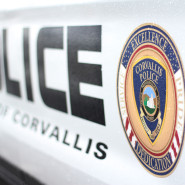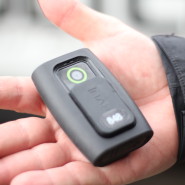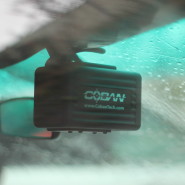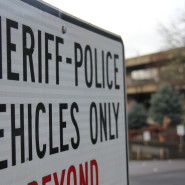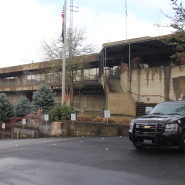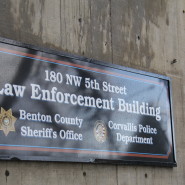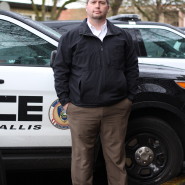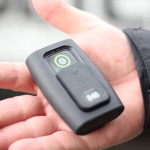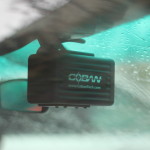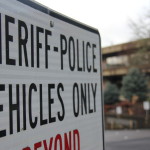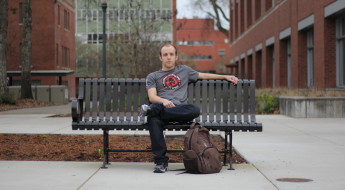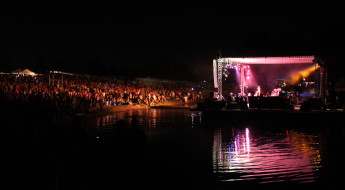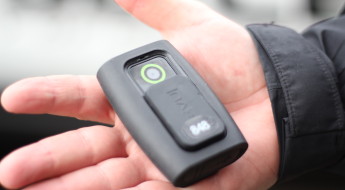Photos by William Allison
It was a another rainy day in Oregon when I approached the Corvallis Police Department on NW 5th Street. Because of this not-so-unusual weather, foot traffic was sparse around the law enforcement center, despite being in the middle of the afternoon. Inside the building, I found it was just as quiet, only hearing occasional ringing of a phone, traffic passing outside, and the distant sound of a train horn.
“I see you were able to get in touch with Lieutenant Wood,” the dispatcher said with a welcoming smile. I nodded in agreement. “One moment, I’ll call him.”
A few moments later, Lieutenant Cord Wood, Public Information Officer for the Corvallis Police Department, exited from a side door. He guided me back toward an interview room, a room that seemed to frequently be used for drilling the truth out of suspected criminals. With a gun locker outside the door, a two-way glass window on one wall, and a very stale odor, it’s apparent that this room was no lounge, nor did it look like they do in the movies. He motioned for me to have a seat in one of several hard metal chairs. I complied.
As our interview started, I learned that Wood, a nearly 18 year veteran of CPD, has been a law enforcement officer in three different communities. As the Public Information Officer, his role is dealing with the press, answering public inquiries, compiling data, and more. However, PIO isn’t the only hat he wears at CPD. Although he didn’t elaborate too much, it’s very apparent that he’s a busy man. Despite being busy, he took time out of his day to sit down and talk with me about police body cameras, something he’s so familiar with, he had a presentation all ready to go.
Does the Corvallis Police Department use body cameras?
Yes. So we’ve had body cameras on our traffic cops – our two motorcycle officers – since 2006. We’ve had in-car video cameras since ’01 and every CPD car in our fleet has a video camera in it. Right now, our motor officers are really the only ones who are wearing body cameras day-to-day because it was a better solution for us than cameras on the motorcycles because of our climate. Every now and then, we’ll have a recruit officer out there with one when we’re trying to teach a point. You’ll have them wear it in training, wearing one during contacts so they can sit down and see and hear themselves.
So outside of the two motorcycle officers, you don’t have any officers who wear body cameras?
Not day-to-day, no.
In doing my research, I found that some Albany police officers purchased their own cameras, do you allow officers to purchase their own?
No, and the reason we wouldn’t do that is once officers are out there wearing them in the public, the video they’re capturing is now a public document. We have to have some kind of standardization in the way we keep and store those documents because we have to keep them for prescribed periods of time. There was a senate bill last year that was kind of the statewide direction from legislature saying ‘if you’re going to do this, this is what we expect you to do’ kind of stuff. They set up some guidelines for public records redaction of information. That’s why wouldn’t let the officer buy their own because navigating your way through formats and different kinds of storage. … Just for those logistical reasons, we wouldn’t allow that.
Why is it only the motorcycle officers?
Well, we initially started with them because it was a solution to equipping their vehicles with cameras like we do with our patrol cars. Then, in the last two-year period when the topic has really gained some momentum and there has been some nationwide push for all police officers to wear bodycams, one of the things we were waiting on was for the legislature to come to a resolution because we didn’t know what they were going to direct when they passed the senate bill last year. Are they going to mandate that all police agencies use bodycams? If they do, how are they going to mandate that they use them? It’s those kinds of things that are going to drive some of our decision-making on how and what to do. They’re going to attach price tags to things so we kind of waited for that to flush out. Now that that’s happened, I think that’s where we’re headed. Right now, we’re trying to figure out what it’s going to cost for us to do this, what the best solution is for us, and can we afford to do it.
What is the cost to have body cameras? Say, just one camera?
There’s not just a standard answer to that question. You’ll have the equipment cost, and there’s a wide range when it comes to the cost of the equipment depending on what you’re trying to do. Once you get past the equipment cost, the next thing you have to look at is storage cost and different solutions have different kinds of storage costs.
If we were to buy one of these camera models that’s allowed us to store our own data on our server, the storage cost is the cost of the server. Then you have to look at a server large enough to do what we need to do. You’re probably in the $15,000 ballpark. If you’re talking about cloud storage, some of the cameras out there are proprietary cloud storage. So, if you buy their camera, you have to buy their cloud storage. There is a per gigabyte cost, but it’s not as quite as simple as that. For example: In month one, I burn an average of 20 gigabytes of video. I’m going to pay for 20 gigabytes of storage. Then, I have the period of time I have to keep that document because it’s a public record document. So, month two, I have to pay for my new 20 gigabytes of data, plus the previous month’s. Then month three, I’m paying for three months of storage. We keep these records for a minimum of six months, but in some situations, we would keep it longer.
So, the cost of the camera itself is small compared to the cost to store the [files]. There’s no simple answer to that question because it also depends on how many people you’re going to equip with them and how long you’re going to retain your files and how much [the officers] are recording. It adds up quick; it can be a lot of money. I know some places that use Taser cameras – smaller agencies than ours – and they’re spending $200,000 to $300,000 a year.
If more funds were available, would you have more cameras?
Kind of where we’re at at the moment is that this is where we’re headed. I think that our officers are going to have the cameras because there are a lot of positive things about them.
What are some pros and cons of bodycams?
They’re good at gathering evidence in some situations. When you go to traffic trial, you can show the judge the video and he can see what the officer is talking about; he can see the violation. Some of these systems have a “30-second lookback” so when you hit the button to record, it’s actually been recording the whole time, but it jumps back 30 seconds and starts the new recording, and catches the violation. So, the judge or jurors have an opportunity to see what it was that the officer saw.
They also do help, or disprove, allegations of misconduct. In our case, they’ve been very helpful in disproving allegations of misconduct.
The downside is that it’s a single camera perspective and it’s not always going to tell the whole story. I want to show you this video. It’s a great example.
Lt. Wood then showed me this video in order to show that a single camera perspective can be misleading.
So, really, what are the stakes of a collegiate football game? Is anyone going to live or die? No. Anyone going to jail? No. But, that’s one of the downsides to these body cameras. People expect them to be a panacea. They expect them to cure all the ills that they perceive there being in law enforcement. I think it’s so important that people keep in mind that it’s a single perspective of the incident. It is not the same perspective that you or I naturally see when we’re in this room. If I’m talking to you, I’m looking at you. If I’m wearing a body camera, it’s sitting here on my chest and it’s looking this way. It’s not seeing what I’m seeing. If I’m pointing a gun at somebody, you’re going to see my hands.
What about privacy concerns?
One of the issues that the public doesn’t always think of is how it will impact their personal privacy. For example, we come to your house tonight because you and your girlfriend have a domestic and that’s a situation that I would have to turn my camera one. I’m in your house, my camera is recording your house and you, maybe your kids running around, you two arguing with each other. And then say we go to arrest your girlfriend and she punches an officer and we have to handcuff her. Now I have use of force. That’s now a public document. If you go through the house bill (HB2757), it’ll explain to you when it is a public record and when is it not. Anytime there is a use of force, the state considers that to be a publicly available document, under certain circumstances. So I would have to go in and blur people’s faces so that they’re not necessarily discernible. And the other thing is when would the public benefit from this versus keeping it private. It’d kind of a muddy water situation. But yes, public records requests could reach those videos, so it does impact people’s personal privacy.
Do all interactions have to be recorded, or is that at the officer’s discretion?
So, we have an established policy. If we’re having a contact with a criminal suspect, someone we’re stopping, somebody we’re maybe going to take enforcement action against, then yes, we’re going to record that. Not everybody will do it the same way we do it. If you look at that house bill, it has some directions to Oregon law enforcement that if you’re going to do it, we expect you to at least do this, setting a standard.
On another note, what has the reaction been from the public to the officers wearing the body cameras, either positive or negative?
I don’t know that we’ve had any negative reaction from it. I think that most instances where people have come in and told us a story and the video footage proves that story to be absolutely false… I don’t know that they’d see that as a positive, but we certainly do. When I give this presentation [to educate people], they ask me, “do we need to do this?” I think that we probably will and I think that the benefits outweigh the negatives.
Have the number of complains increased or decreased at all? How has this helped with complaints?
There have been instances where people have come in, like I was just talking about, and they give us a story of what happened and we go look at the video of what happened, and it’s absolutely not what happened. Those are easily disprovable allegations, which cuts down on our time investigating them. We really don’t get a ton of officer-related complaints. Our staff do a really good job out in the community. They certainly provide a perspective on the interaction between an officer and a citizen, so it can be helpful, but again, it depends on what that perspective shows. If it shows the back of somebody’s arm or gets knocked off and it’s laying in the ditch, you may get an audio recording, but that’s about it.
What do the officers think of the body cameras? Do other officers want them?
You know, the ones that have tried them out, they like them. They don’t have an issue with them. I would say that they’re open to whatever we decide to do as a department.
What other challenges are there?
One of the other things to consider that generally isn’t thought and it’s an important aspect is records requests. We’ve talked a lot about the costs. There’s the public records costs and the copying of the videos, and the redaction of the video, and all of that other stuff that’s protected information that can’t be released as part of an information request, it has a cost. I have to pay somebody to do that. We had to come up with a contract with a local video editing company to redact faces because we didn’t have the technology in-house to do it. That all has a cost that the community bears because it’s taxpayers dollars.
Where do you see the future of body cameras going, as a whole, not just here?
I think that there will be a move toward doing it. I hope that as law enforcement makes that motion toward equipping the officers with body cameras that we’re thoughtful in our policies on retention, when and when not to record. I think we need to be thoughtful of the larger impacts, not just to our budgets, but our citizens’ privacy concerns. I think that we have to be thoughtful about the security of our data. I think that we need to do a good job educating the community on what they’re truly capable of and what they’re not capable of. I know some people think they will do anything and everything and that if you have an officer involved shooting, all you have to do is look and it’s right there; it’s not that simple. I think that we have that obligation to do that outreach and education so we can move forward with that joint understanding between the officers and the community on what these are and what they can do.



